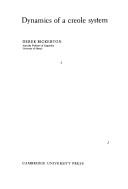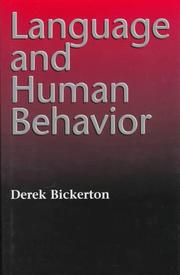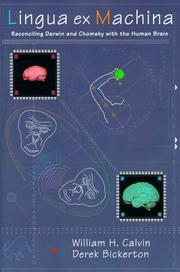| Listing 1 - 10 of 10 |
Sort by
|
Book
ISBN: 0226046109 Year: 1990 Publisher: Chicago (Ill.): University of Chicago press
Abstract | Keywords | Export | Availability | Bookmark
 Loading...
Loading...Choose an application
- Reference Manager
- EndNote
- RefWorks (Direct export to RefWorks)
Linguistics --- Evolutie [Menselijke ] --- Evolution humaine --- Homme--Evolution --- Human evolution --- Mens--Evolutie --- Menselijke evolutie --- Evolution --- Language --- Language and languages --- Homme --- Langage et langues --- Origin --- Origines --- Biological Evolution. --- Language. --- 800 --- -#SBIB:309H518 --- #SBIB:309H514 --- Foreign languages --- Languages --- Anthropology --- Communication --- Ethnology --- Information theory --- Meaning (Psychology) --- Philology --- Evolution (Biology) --- Physical anthropology --- Evolutionary psychology --- Human beings --- Evolution, Biological --- Sociobiology --- Taalwetenschap. Taalkunde. Linguistiek --- Verbale communicatie: sociologie, antropologie, sociolinguistiek --- Linguistiek --- Human evolution. --- Origin. --- Evolution. --- 800 Taalwetenschap. Taalkunde. Linguistiek --- Biological Evolution --- #SBIB:309H518 --- Origin of languages --- Speech --- Language and languages - Origin. --- Dialect --- Dialects

ISBN: 052120514X 9780521205146 Year: 1975 Publisher: London Cambridge university press
Abstract | Keywords | Export | Availability | Bookmark
 Loading...
Loading...Choose an application
- Reference Manager
- EndNote
- RefWorks (Direct export to RefWorks)
Book
ISBN: 1857285417 Year: 1996 Publisher: London UCL Press
Abstract | Keywords | Export | Availability | Bookmark
 Loading...
Loading...Choose an application
- Reference Manager
- EndNote
- RefWorks (Direct export to RefWorks)
Communicatie --- Neurolinguïstiek --- Psycholinguïstiek --- Taal --- evolutie --- Communicatie. --- Neurolinguïstiek. --- Psycholinguïstiek. --- evolutie. --- Psycholinguistics --- Language and languages --- Human evolution
Book
ISBN: 9783946234081 9783946234098 9783946234104 9781523647156 3946234089 3946234100 3946234097 Year: 2015 Publisher: Language Science Press
Abstract | Keywords | Export | Availability | Bookmark
 Loading...
Loading...Choose an application
- Reference Manager
- EndNote
- RefWorks (Direct export to RefWorks)
Roots of language was originally published in 1981 by Karoma Press (Ann Arbor). It was the first work to systematically develop a theory first suggested by Coelho in the late nineteenth century: that the creation of creole languages somehow reflected universal properties of language. The book also proposed that the same set of properties would be found to emerge in normal first-language acquisition and must have emerged in the original evolution of language. These proposals, some of which were elaborated in an article in Behavioral and Brain Sciences (1984), were immediately controversial and gave rise to a great deal of subsequent research in creoles, much of it aimed at rebutting the theory. The book also served to legitimize and stimulate research in language evolution, a topic regarded as off-limits by linguists for over a century. The present edition contains a foreword by the author bringing the theory up to date; a fuller exposition of many of its aspects can be found in the author’s most recent work, More than nature needs (Harvard University Press, 2014).
E-books --- Philology. Linguistics --- Linguistics --- Language and languages --- Origin. --- Origin of languages --- Speech --- Origin --- pidgin --- creole --- language origins --- language evolution --- Semantics --- Stratum (linguistics) --- Verb
Book
ISBN: 067472853X 0674728521 9780674728523 9780674724907 0674724909 Year: 2014 Publisher: Cambridge, Mass. Harvard University Press
Abstract | Keywords | Export | Availability | Bookmark
 Loading...
Loading...Choose an application
- Reference Manager
- EndNote
- RefWorks (Direct export to RefWorks)
How did humans acquire cognitive capacities far more powerful than any hunting-and-gathering primate needed to survive? Alfred Russel Wallace, co-founder with Darwin of evolutionary theory, set humans outside normal evolution. Darwin thought use of language might have shaped our sophisticated brains, but this remained an intriguing guess--until now. Combining state-of-the-art research with forty years of writing and thinking about language origins, Derek Bickerton convincingly resolves a crucial problem that biology and the cognitive sciences have systematically avoided. Before language or advanced cognition could be born, humans had to escape the prison of the here and now in which animal thinking and communication were both trapped. Then the brain's self-organization, triggered by words, assembled mechanisms that could link not only words but the concepts those words symbolized--a process that had to be under conscious control. Those mechanisms could be used equally for thinking and for talking, but the skeletal structures they produced were suboptimal for the hearer and had to be elaborated. Starting from humankind's remotest past, More than Nature Needs transcends nativist thesis and empiricist antithesis by presenting a revolutionary synthesis that shows specifically and in a principled way how and why the synthesis came about.
Language and languages. --- Human evolution --- Language acquisition --- Cognitive grammar. --- Psycholinguistics. --- Language, Psychology of --- Language and languages --- Psychology of language --- Speech --- Linguistics --- Psychology --- Thought and thinking --- Cognitive linguistics --- Grammar, Comparative and general --- Psycholinguistics --- Acquisition of language --- Developmental linguistics --- Developmental psycholinguistics --- Language development in children --- Psycholinguistics, Developmental --- Interpersonal communication in children --- Evolution (Biology) --- Physical anthropology --- Evolutionary psychology --- Human beings --- Foreign languages --- Languages --- Anthropology --- Communication --- Ethnology --- Information theory --- Meaning (Psychology) --- Philology --- Psychological aspects. --- Psychological aspects --- Acquisition --- Origin --- Sociolinguistics

ISBN: 0295974575 Year: 1996 Publisher: Seattle (Wash.) : University of Washington press,
Abstract | Keywords | Export | Availability | Bookmark
 Loading...
Loading...Choose an application
- Reference Manager
- EndNote
- RefWorks (Direct export to RefWorks)
Book
ISBN: 1282694286 9786612694288 0262258587 026229379X 9780262258586 0262013568 9780262013567 9781282694286 Year: 2009 Publisher: Cambridge, Mass. MIT Press
Abstract | Keywords | Export | Availability | Bookmark
 Loading...
Loading...Choose an application
- Reference Manager
- EndNote
- RefWorks (Direct export to RefWorks)
Interdisciplinary perspectives on the evolutionary & biological roots of syntax, describing current research on syntax in fields ranging from linguistics to neurology.
Grammar, Comparative and general --- Biolinguistics --- Syntax --- Biology --- Linguistics --- LINGUISTICS & LANGUAGE/General --- Grammar --- Philology
Book
ISBN: 9789027222541 9789027287823 9027222541 9027287821 1282775022 9781282775022 9786612775024 Year: 2010 Publisher: Amsterdam Benjamins
Abstract | Keywords | Export | Availability | Bookmark
 Loading...
Loading...Choose an application
- Reference Manager
- EndNote
- RefWorks (Direct export to RefWorks)
Somewhere and somehow, in the 5 to 7 million years since the last common ancestors of humans and the great apes, our ancestors "got" language. The authors of this volume all agree that there was no single mutation or cultural innovation that took our ancestors directly from a limited system of a few vocalizations (primarily innate) and gestures (some learned) to language. They further agree to use the term "protolanguage" for the beginnings of an open system of symbolic communication that provided the bridge to the use of fully expressive languages, rich in both lexicon and grammar. But here consensus ends, and the theories presented here range from the compositional view that protolanguage was based primarily on words akin to the nouns and verbs, etc., we know today with only syntax lacking to the holophrastic view that protolanguage used protowords which had no meaningful subunits which might nonetheless refer to complex but significantly recurrent events. The present volume does not decide the matter but it does advance our understanding. The lack of any direct archaeological record of protolanguage might seem to raise insuperable difficulties. However, this volume exhibits the diversity of methodologies that can be brought to bear in developing datasets that can be used to advance the debate.
Etymology --- Historical linguistics --- Psycholinguistics --- Language and languages --- Language acquisition. --- Human evolution. --- Historical linguistics. --- Etymology. --- Diachronic linguistics --- Dynamic linguistics --- Evolutionary linguistics --- Language and history --- Linguistics --- Evolution (Biology) --- Physical anthropology --- Evolutionary psychology --- Human beings --- Acquisition of language --- Developmental linguistics --- Developmental psycholinguistics --- Language development in children --- Psycholinguistics, Developmental --- Interpersonal communication in children --- Grammar, Comparative and general --- Word history --- Historical lexicology --- History --- Origin --- Acquisition --- Derivation --- Langage et langues --- Langage --- Homme --- Linguistique historique --- Étymologie --- Évolution --- Langues --- Etymologie --- Évolution

ISBN: 0262032732 0262531984 0262316137 9780262316132 9780262032735 9780262531986 Year: 2000 Publisher: Cambridge, Mass. : MIT Press,
Abstract | Keywords | Export | Availability | Bookmark
 Loading...
Loading...Choose an application
- Reference Manager
- EndNote
- RefWorks (Direct export to RefWorks)
"A proper lingua ex machina would be a language machine capable of nesting phrases and clauses inside one another, complete with evolutionary pedigree. Such circuitry for structured thought might also facilitate creative shaping up of quality (figuring out what to do with the leftovers in the refrigerator), contingency planning, procedural games, logic, and even music. And enhancing structural thought might give intelligence a big boost. Solve the cerebral circuitry for syntax, and you might solve them all." "William Calvin and Derek Bickerton offer three ways for getting from ape behaviors to syntax. They focus on the transition from simple word association in short sentences (proto-language) to longer recursively structural sentences (requiring syntax). They are after invention via sidesteps (Darwinian conversions of function), not straight-line gradual improvements."--Jacket.
#PBIB:2001.2 --- Psycholinguistics --- Neurolinguistics --- Brain --- Language Development --- Neuropsychology --- Evolution --- physiology --- Chomsky, Noam, --- Darwin, Charles, --- Neuro-linguistics --- Biolinguistics --- Higher nervous activity --- Chomsky, Noam. --- Darwin, Charles, Robert --- Darwin, Charles --- Chomsky, Noam --- Chomsky, Abraham Noam --- Neurolinguistics. --- Evolution. --- Brain - Evolution --- Brain - physiology --- Chomsky, Noam, - 1928 --- -Darwin, Charles, - 1809-1882
Book
ISBN: 9027252297 1556191626 9786613328182 1283328186 9027277826 9789027277824 9781556191626 9789027252296 Year: 1991 Publisher: Amsterdam Benjamins
Abstract | Keywords | Export | Availability | Bookmark
 Loading...
Loading...Choose an application
- Reference Manager
- EndNote
- RefWorks (Direct export to RefWorks)
This collection of original essays is intended to both celebrate Derek Bickerton's sixty-fifth birthday and honor his long and eminent career. Each author included in the volume is a noted scholar who has distinguished him/herself in some area of linguistics and has professionally or personally interacted with Bickerton and been influenced by his work. While the papers make independent thematic contributions, they also discuss, augment, present alternatives to, or are inspired in some way by Bickerton's seminal ideas or penetrating analyses. The book is organized into 5 sections.
Creolan languages --- Creole dialects. --- Creole languages --- Creolized languages --- Languages, Mixed --- Pidgin languages
| Listing 1 - 10 of 10 |
Sort by
|

 Search
Search Feedback
Feedback About UniCat
About UniCat  Help
Help News
News